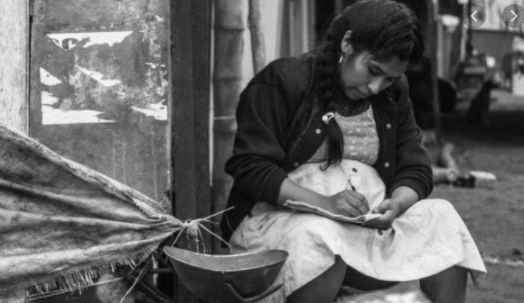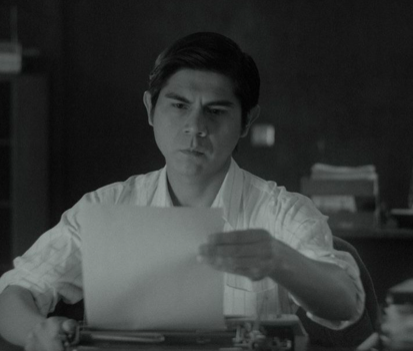Song without a Name: Peruvian Film Speaks for Mothers and Children Ensnared by Baby Traffickers
By Sue Weston and Susie Rosenbluth, Two Sues on the Aisle
Song without a Name (Cancion Sin Nombre), which has won a slew of international awards, including being the first Peruvian film by a female director to play in Cannes, recounts the desperation of a parent’s worst nightmare: A baby is kidnapped and the mother has nowhere to go and no one to turn to for help.
In this case, the subject is the anguish of poverty-stricken Andean peasant women in Peru in 1988, but it might just as well have been about any of the poverty-stricken Yemenite-Jewish immigrant women in Israel in the late 1940s and early ‘50s whose babies were taken to hospitals, never to be seen again by their families. In both cases, the enormous divide between poverty and privilege, between the ability to navigate the system and the tragedy of falling into its cracks is overwhelming.
Shot by its writer and director, Melina León, in black and white, Song without a Name is as intimate as a home movie. The monochromatic picture and the subtitles translating the Spanish into English do not detract from the sounds, colors, and even smells of Peru, all of which combine to draw the viewer into the plight of a young expectant mother falling prey to those waiting to exploit her and her child.
Set against the backdrop of the Peruvian government’s struggle against the Shining Path guerrilla group, the film exposes the real-life tragedy of a baby-trafficking conspiracy in which uneducated and desperately poor mothers were enticed by radio announcements to deliver their infants in networks of supposedly free clinics. Immediately after birth, their newborns were spirited away and the “clinics” disappeared, leaving the poor indigenous women and their families grieving without hope of receiving answers or the possibility of recourse.
When pressed, officials, who systematically turned a blind eye to the parents’ attempts to seek help, excused themselves by glancing at ultra-modern Boeing 747 airplanes leaving Lima for capitals throughout Western Europe and, for all we know, the United States, insisting that the babies’ new adoptive parents would be able to give the children advantages the poor birth parents could not even dream about.
Similar narratives were heard from Israeli officials at the time of the birth of the state about poor Sephardic babies given to childless Jewish couples in the West.
Song without a Name follows the story of Georgina (Pamela Mendoza) a pregnant Quechuan woman who, with her husband, journeys from their small village to sell potatoes in Lima. Lured to a clinic by the promise of a free and safe delivery, Georgina goes alone to the address given by the radio. There, she is examined and told to come back when she goes into labor.

Ms. León and Ms. Mendoza are unsparing in their depiction of a mother overcoming fear and physical difficulty to give birth safely to her first child. Every flight of steps she must climb to reach the “clinic” requires an all-consuming effort, every birth pang is searing, and the joy of hearing that it’s a girl is heartbreakingly short-lived. Within minutes of giving birth, the mother is unceremoniously ushered out the door and dumped on the sidewalk, her child whisked away. She bangs on the door, pleads to see her baby, but to no avail.
She and her husband receive no more help from the police or other government officials who send them from one office to another in a Kafkaesque maze of bureaucratic offices and useless bureaucrats.
Finally, with nowhere else to turn, she stumbles into the La Reforma newspaper office where the editor, with a sharp nose for a story, assigns her to Pedro Campas (Tommy Párraga) a lonely, bright, too-young-to-be-so-jaundiced journalist.
Together, they uncover the truth about ubiquitous Peruvian child-trafficking, a monstrous business conspiracy between the government and the local underworld.

Although given only cursory exposure in the film, the Shining Path terrorists receive a cameo role, showing how peasants like Georgina and her family were caught in the middle of unrelenting violence, with both sides claiming to be interested only in helping them. In their native villages, any misunderstanding could result in being shot by the Shining Path; if they withheld information about the Shining Path guerillas, peasants could be shot by the Peruvian army, which was trying to put down the insurrection. Small wonder peasants like Georgina and her husband would opt to flee their essentially lawless village to live in crushing poverty in Lima. Small wonder her unemployed husband, robbed of his child by the government, would turn to the Shining Path for sustenance.
In writing their script, Ms. León and her co-author, Michael J. White, took for their inspiration a real incident that occurred in 1981. At the time, Ms. León’s father, Ismael León, to whom the film is dedicated, was a journalist for the Peruvian newspaper La República, covering stories about the literally hundreds of cases of baby-trafficking.
Twenty-five years later, a French woman, whose adoptive parents knew she had been born to a Peruvian mother, sought out Mr. León, hoping he could reunite her with her birth mother. He did, and there is now a foundation trying to perform similar miracles for other mothers and children who had been ripped apart.
As Ms. León reminds us, human trafficking remains a worldwide crisis, occasionally making headlines as poor children are abducted and sold for everything from sexual exploitation to adoption by overseas couples and organ sales. As Jews who value every human life with its limitless potential and hope, we know any and all efforts to expunge this evil must be supported.
Just recently, President Donald Trump explained his struggle to stop the flow of undocumented migrants, and especially women and children, into the United States. “Human trafficking erodes personal dignity and destroys the moral fiber of society. It is an affront to humanity that tragically reaches all parts of the world,” he said.
In Song with a Name, when Georgina sings a lullaby into an empty blanket to sooth her missing baby, she graphically portrays the name of the film and, in so doing, gives all abducted children and their mothers a voice. The film showcases the plight of the poor and the complacency of the legal system.
Release date December 8, 2020 available through the Film Movement
***
Two Sues on the Aisle bases its ratings on how many challahs it pays to buy (rather than make) in order to see the play, show, film, or exhibit being reviewed.
“Song without a Name” received 3 challahs






